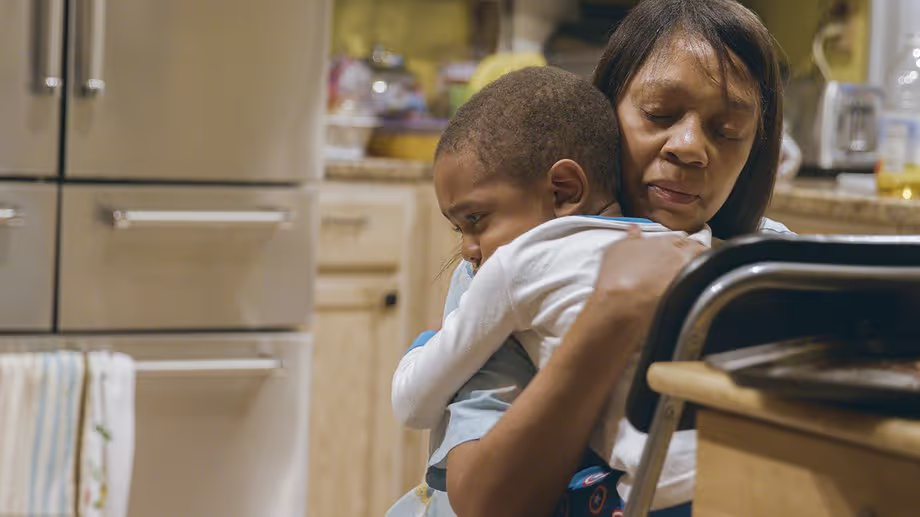Through The Night Discussion Guide Background Information
Background Information

The African proverb, “it takes a village to raise a child” highlights the importance of community centered child-rearing. Raising healthy, happy, holistic children takes the insight, influence and input of many trusted individuals and groups. Between immediate and extended family members, neighbors, caregivers, educational and extra-curricular cohorts; a child’s ‘village’ is critical to their emotional, intellectual, physical, mental and social development.
Through the Night highlights the exhausting intersection of gender inequality, racism and the constant economic precarity plaguing working class families. Women often bear the responsibility of raising children, are paid less than their male counterparts and face unique socio-economic and racial challenges. Thegig economy, primarily service industry jobs that trap people with temporary labor and low wages, disproportionately affects Black and Latinx workers. The COVID-19 pandemic magnified the disparities destroying marginalized communities beholden to industries that often demand more than they deliver. Flexible hours with limited access to health care, sick leave and unemployment benefits perpetuate toxic work environments. In the film we see the toll the cycle of capitalism has on mothers, in particular, fighting to provide for their families.
The Economic Policy Institute released a report in January 2020 showing American parents are annually spending$42 billion for childcare and early education programs. TheU.S. Census in 2021 estimates there are close to 7 million households with children under 5 years old, not including homes that also support grandchildren and extended family members, and those families spend anaverage of $10,000 for childcare. Childcare is getting more and more expensive nationwide but especially in urban centers and densely populated areas.
Providing and finding safe, affordable and convenient care for children is overwhelmingly the responsibility of women and working mothers. In2018 an American Community Survey by the U.S. Census indicated that about two-thirds of the 23.5 million women with children under 18 worked full time and working mothers account for 32% of all employed women. As essential workers, 40% of employed mothers work in health care, education, hospitality and social services.
Despite the educational, employment and economic advancements all women have made in the last 50 years, the impact of the Covid-19 pandemic has disproportionately impacted Black, Hispanic and single mothers. TheU.S. Bureau of Labor and Statistics reported in September 2020 that Black women’s average unemployment rate was 10.9% and Hispanic women 11.4% compared to 7.6% for their white counterparts. The National Women’s Law Center estimated that women in the U.S. account for 55% of the overall job loss since the onset of the pandemic. The pandemic is not the root cause of these tremendous setbacks but it has exposed the inequities that affect minority communities. Specifically, race, gender, class and socio-economic status in the United States and the intersection of systemic racism, sexism and capitalism.
A 2020-2021 New York Times multimedia series “The Primal Scream” explores the crisis American mothers are facing during this once in a generation catastrophe. Since the onset of the crisis in March 2020, close to 1 million mothers haveleft the workforce and the nonprofit Feeding America discoveredone in four children under 18 are currently food insecure. Women and working mothers daily face the impossible decision of how to provide the basic necessities for their families and care for their children.
March 24, the day into the year in which it takes women on average to earn what men did the previous year, is known asEqual Pay Day in the U.S. This date is a stark reminder of the income inequality between women and men. In 2021, white women earn 82 cents for every dollar earned by white men according to data analyzed by the National Women’s Law Center. However Black women earn 63 cents, Native American women 60 cents and Latina women 55 cents in comparison.
Through the Night highlights the burnout that many women and working mothers face due to the demands on their busy lives. More than just a catchphrase, burnout is a WHO-certified health condition impacting millions of families nationwide. In 2019 theWorld Health Organization declared burnout an “occupational phenomenon resulting from chronic workplace stress”.
Passionately persistent in all the paid and unpaid labor women participate in, intentional self-care is a revolutionary act. Through the Night showcases the detrimental health and well-being effects of being overworked and exhausted. Creating the boundaries necessary to properly rest, recover and rejuvenate is essential to continuing the critical community care provided by essential workers.

